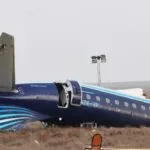
(LONDON) — Azerbaijani authorities investigating last week’s Azerbaijan Airlines crash in Kazakhstan are probing the “disturbing” possibility that Russian air traffic controllers may have directed the damaged plane out over the Caspian Sea, a source with knowledge of the investigation told ABC News.
Azerbaijan, Kazakhstan and Russia have all opened investigations into the cause of the Azerbaijan Airlines Flight J2-8243 crash.
The source — who did not wish to be identified given the sensitivity of the ongoing Azerbaijani investigation — said Azerbaijani authorities have “very little doubt” that flight J2-8243 was damaged by a Russian Pantsir anti-aircraft system over Chechnya on Dec. 25.
Azerbaijani President Ilham Aliyev suggested on Sunday that the plane was shot down by Russia unintentionally, that it “was damaged from the outside on Russian territory” and was “rendered uncontrollable by electronic warfare.” He cited fire from the ground for serious damage to the tail section of the aircraft and apparent shrapnel holes in its fuselage.
Russian President Vladimir Putin apologized for the plane crashing, but stopped short of saying Russia was behind a strike.
Kremlin spokesperson Dmitry Peskov on Friday said, “The investigation into the air accident is ongoing. And we do not think we have a right to give any assessments and will not do so until conclusions are drawn based on the results of the investigation. We have our own aviation authorities that can do it, and this information may come only from them.”
The source with knowledge of the investigation said the subsequent conduct of air control officials after what they suspect to be a Russian strike on the plane was a focus of the ongoing investigation into the incident, in which 38 of the 67 people on board were killed.
The aircraft was heading northwest from the Azerbaijani capital, Baku, to Grozny in Russia — the capital city of Russia’s Chechen Republic — when the incident occurred. At the same time, Ukrainian drones were attacking targets in Chechnya, prompting a response from Russian anti-aircraft units.
Early explanations for the crash included a collision with birds and heavy fog in the area. Some Russian media organizations also suggested Ukrainian drones collided with the plane during their attack on targets in Chechnya.
Russian authorities did not immediately close Chechen airspace, the source said, adding that this decision may have been negligent but does not appear to prove any intent by Russia to shoot down the incoming Azerbaijan Airlines aircraft.
The doomed plane flew east across the Caspian Sea to the Kazakh city of Aktau some 280 miles away — rather than landing in Chechnya or another closer airport, which was “puzzling” for investigators, according to the source.
The area was blanketed in heavy fog at the time of the incident, survivors said, forcing the aircraft to make two landing attempts at Grozny airport before it was rocked by apparent explosions on its third approach.
Russia’s Rosaviatsia air transport agency said Friday that the captain was offered other airports at which to land on account of the fog and drone alerts, but chose Aktau. It was not immediately clear which airports had been offered or why the plane didn’t land at one of them.
The investigators’ “most obvious” and “most unfortunate” theory is that Russian air traffic control officials may have directed the plane over the Caspian Sea, the source said.
That explanation, if it turns out to be true, is “disturbing” but possible, the source added.
The aircraft ultimately crashed around 2 miles from Aktau International Airport on the Caspian Sea’s eastern coast.
Putin on Saturday spoke with Aliyev and “apologized for the tragic incident that occurred in Russian airspace and once again expressed his deep and sincere condolences to the families of the victims and wished a speedy recovery to the injured,” a Kremlin readout said.
“At that time, Grozny, Mozdok and Vladikavkaz were being attacked by Ukrainian unmanned aerial vehicles, and Russian air defence systems repelled these attacks,” it added.
On Sunday, Aliyev said Moscow should admit responsibility for the incident and offer compensation.
“The facts are that the Azerbaijani civilian plane was damaged from outside on Russian territory, near the city of Grozny, and practically lost control,” Aliyev told state television.
Aliyev said he did not believe the damage was intentional, though expressed disappointment over alternate theories for the crash offered by Russian authorities in the immediate aftermath.
“This openly showed that the Russian side wants to hush up the issue and this, of course, does no one credit,” he said.
“Unfortunately, for the first three days we heard nothing from Russia except crazy versions,” Aliyev said.
Russia and Azerbaijan — which until 1991 was a constituent state of the Soviet Union — are both members of the Moscow-centric Commonwealth of Independent States bloc. The neighboring nations retain close political, economic and security ties.
Bilateral relations have become more important to the Kremlin since its February 2022 invasion of Ukraine prompted a collective Western effort to isolate Moscow on the international stage.
Azerbaijan, meanwhile, has pursued non-alignment and a balance in its relations with Russia and the West. The country has notably become an important source of natural gas for Europe, while also serving as a key conduit for Russian oil exports.
ABC News’ Dragana Jovanovic, Ines de la Cuetara and Ellie Kaufman contributed to this report.
Copyright © 2024, ABC Audio. All rights reserved.
